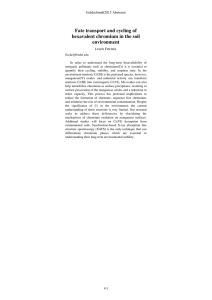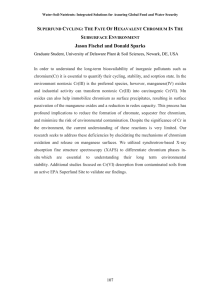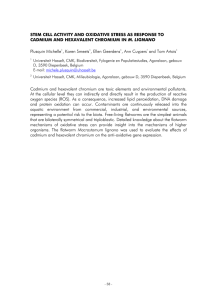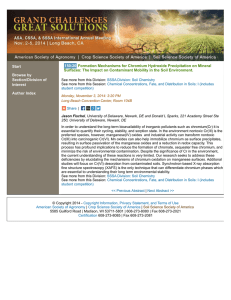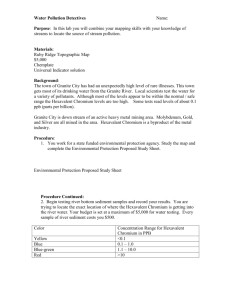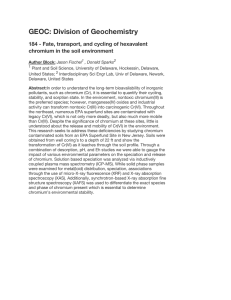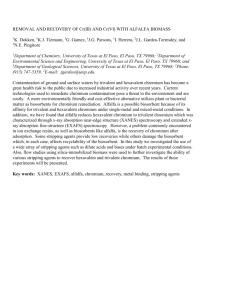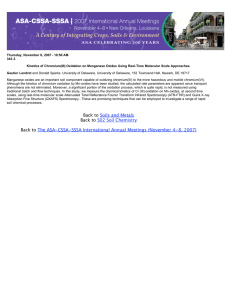State of New Jersey MEMORANDUM
advertisement
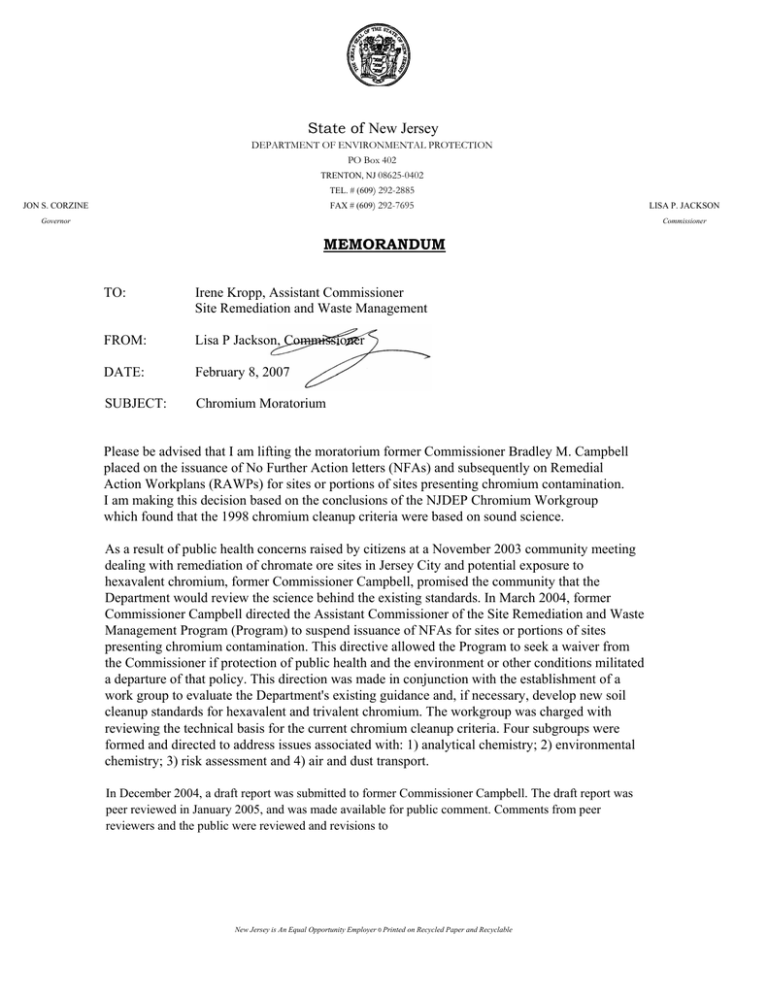
State of New Jersey DEPARTMENT OF ENVIRONMENTAL PROTECTION PO Box 402 TRENTON, NJ 08625-0402 TEL. # (609) 292-2885 FAX # (609) 292-7695 JON S. CORZINE Governor LISA P. JACKSON Commissioner MEMORANDUM TO: Irene Kropp, Assistant Commissioner Site Remediation and Waste Management FROM: Lisa P Jackson, Commissioner DATE: February 8, 2007 SUBJECT: Chromium Moratorium Please be advised that I am lifting the moratorium former Commissioner Bradley M. Campbell placed on the issuance of No Further Action letters (NFAs) and subsequently on Remedial Action Workplans (RAWPs) for sites or portions of sites presenting chromium contamination. I am making this decision based on the conclusions of the NJDEP Chromium Workgroup which found that the 1998 chromium cleanup criteria were based on sound science. As a result of public health concerns raised by citizens at a November 2003 community meeting dealing with remediation of chromate ore sites in Jersey City and potential exposure to hexavalent chromium, former Commissioner Campbell, promised the community that the Department would review the science behind the existing standards. In March 2004, former Commissioner Campbell directed the Assistant Commissioner of the Site Remediation and Waste Management Program (Program) to suspend issuance of NFAs for sites or portions of sites presenting chromium contamination. This directive allowed the Program to seek a waiver from the Commissioner if protection of public health and the environment or other conditions militated a departure of that policy. This direction was made in conjunction with the establishment of a work group to evaluate the Department's existing guidance and, if necessary, develop new soil cleanup standards for hexavalent and trivalent chromium. The workgroup was charged with reviewing the technical basis for the current chromium cleanup criteria. Four subgroups were formed and directed to address issues associated with: 1) analytical chemistry; 2) environmental chemistry; 3) risk assessment and 4) air and dust transport. In December 2004, a draft report was submitted to former Commissioner Campbell. The draft report was peer reviewed in January 2005, and was made available for public comment. Comments from peer reviewers and the public were reviewed and revisions to New Jersey is An Equal Opportunity Employer 0 Printed on Recycled Paper and Recyclable the draft report were completed in May 2005. The report has been available on the Department's website in its draft form at www.state.nj.us/dep/dsr/chromium. It is the conclusions/recommendations of this May 2005 draft that form the basis for my decision to modify the existing NFA moratorium. In addition to lifting the moratorium, I will be reinstating the risk assessment subgroup once the U.S. Department of Health and Human Services, National Toxicology Program's study of hexavalent chromium is completed. The risk assessment subgroup will evaluate any new information to see if it warrants the development of new chromium standards for soils. At the conclusion of their assessment, the May 2005 draft report will be updated as necessary and finalized. Specifically, I am modifying the existing chromium policy to apply to sites or portions of sites, taking into account the intended future uses, as follows: • An unconditional NFA approval relative to chromium can be issued for soils if 1) hexavalent chromium contamination in excess of 20 ppm is excavated and removed from the site and 2) any remaining chromium contamination that fails the SPLP test for impact to ground water is excavated and removed, from the site or treated and left on site provided the treated chromium will not fail the SPLP test in the future. An unconditional NFA approval relative to chromium can also be issued for soils if hexavalent chromium contamination in excess of 20ppm is treated and left on site provided the resulting concentration of hexavalent chromium in the soil remains below 20 ppm (i.e., no "rebound effect" for hexavalent chromium) • An unconditional NFA approval relative to chromium can be issued for ground water when there is no ground water contamination above the ground water quality standard for chromium. In addition, as noted above, all existing on site and off-site sources of chromium contamination producing an exceedance of the ground water quality standard must be remediated. • A conditional NFA (limited restricted use, restricted use) for soils and/or groundwater relative to chromium can be issued at a site or that portion of a site which have or will have residential, day care or educational uses when 1) hexavalent chromium soil contamination in excess of 20 ppm is excavated to a depth of 20 feet below grade or to the depth of the lowest point any underground structure made of porous material (whichever is greater), or if hexavalent chromium soil contamination is treated and left on site to a depth of 20 feet below grade or to a depth of the lowest point of any underground structure made of porous material (whichever is greater) provided the concentration of hexavalent chromium in such soil remains below 20 ppm (i.e., no "rebound effect" for hexavalent chromium), 2) a capillary break is put into place to prevent any crystallization of chromate on soil surfaces or subsurface building walls or floors, 3) any remaining chromium contamination left on site to a depth of 20 feet below grade or to a depth of the lowest point of any underground structure made of porous material (whichever is greater) must pass and continue to the SPLP test., and 4) ground water contamination and any on site sources of chromium ground water contamination below a depth of 20 feet below grade or to a depth of the lowest point of any underground structure made of porous material (whichever is greater) are controlled, contained or treated, through the use of conventional or innovative technologies, and a Classification Exception Area is established. As contamination would be left on site in this situation, a deed notice would be required. As always, the property owner has to agree to a deed restriction. Financial assurance must be in place for the operation and maintenance of institutional and engineering controls for duration of the intended treatment, containment, or controls. A conditional NFA (limited restricted use, restricted use) for soils and/or groundwater can be issued at a site or that portion of a site which have or will have commercial/industrial/open space uses consistent with the technical regulations and oversight regulations. Remedial action plans that result in unconditional NFAs may be prioritized over those plans that do not. Assistant Director approval is required for remedial action workplan approvals which will result in conditional NFAs. Assistant Commissioner approval is required for remedial action workplan approvals that request alternate remedial standards for soils or any other proposed remedial action not addressed in this policy.
